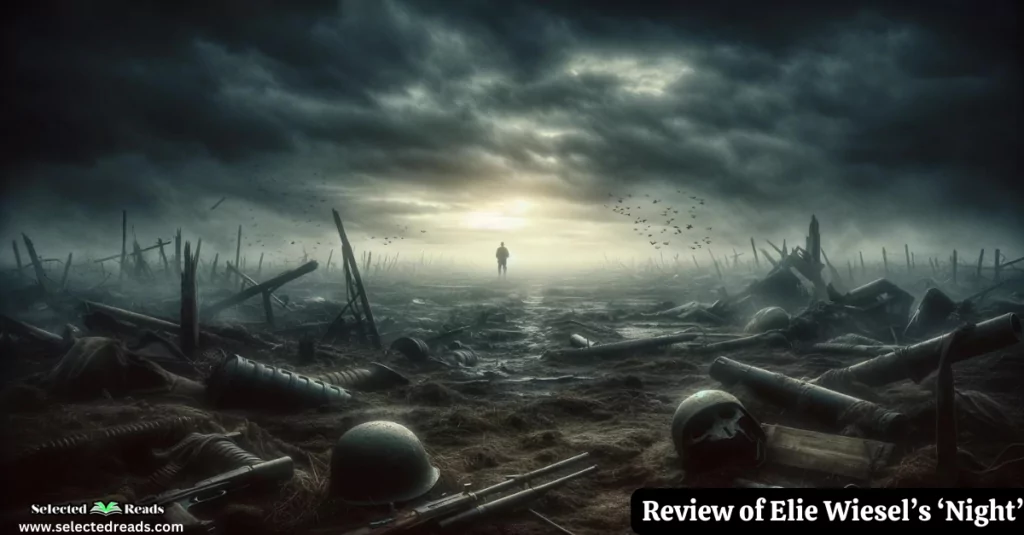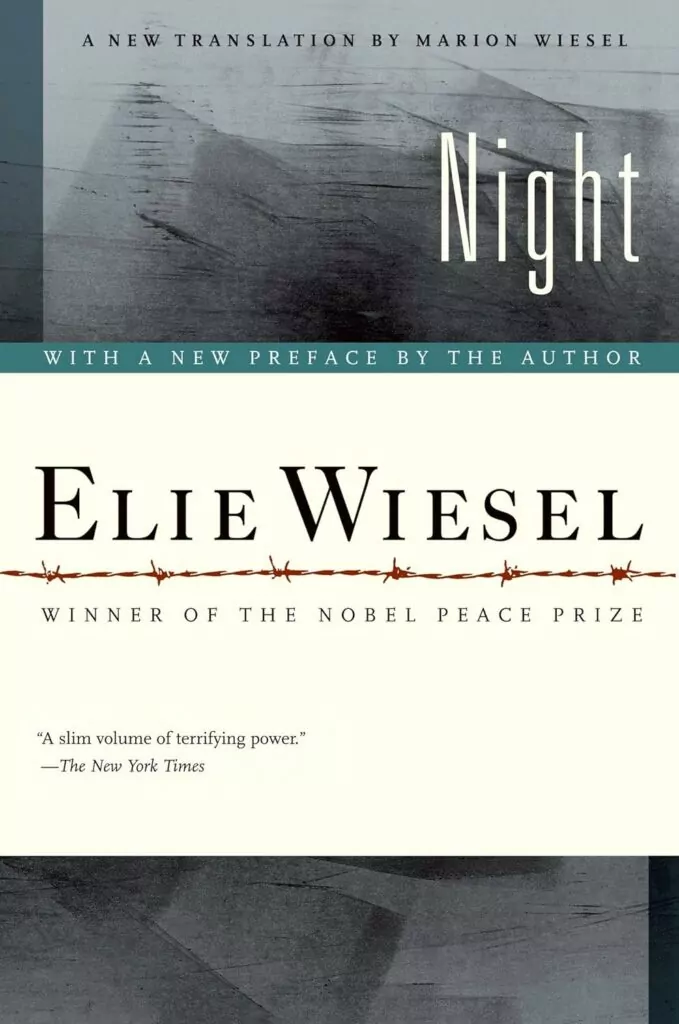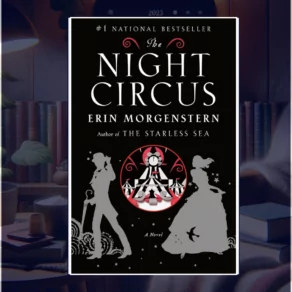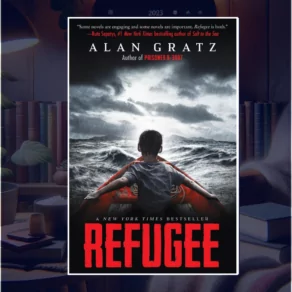In this post, we’ll embark on an insightful journey through Elie Wiesel’s poignant memoir, “Night.” This powerful narrative, not just a story but a profound testimony, chronicles the horrors and profound experiences of a young Eliezer during the Holocaust. We’ll begin with an extended summary of the book, delving deep into the thematic and philosophical layers that make this work a masterpiece of Holocaust literature.
Following that, we’ll introduce and analyze the key characters who add depth, humanity, and complexity to this harrowing account of survival and loss. Then, we’ll transition into a section crafted specifically for book clubs. Here, we’ll present thought-provoking questions designed to spark deep discussions, offering readers and book club members an opportunity to engage critically with the text.
Elie Wiesel Night Summary
“Night” is a profoundly moving piece, not merely for its depiction of the unimaginable horrors of the Holocaust, but for its intimate exploration of a young soul grappling with the darkest facets of human nature and the struggle to retain humanity amidst inhumanity.
Elie Wiesel’s narrative takes us through his experiences as a teenager during the Holocaust, a time that turned his world devastatingly upside down. From the deprivation of basic human dignity to the constant shadow of death hanging over the inmates, Wiesel paints a vivid picture of life in the Nazi death camps of Auschwitz and Buchenwald. The recounting of daily terrors, the chilling normalcy of sadism, and the perversion of human values form the backbone of this memoir, making it an essential chronicle of the time.
But “Night” delves deeper. It’s not just a memoir; it’s a profound reflection, a meditation on the nature of evil and the fragility of human morality under extreme circumstances. Wiesel’s journey is not only physical but profoundly spiritual and philosophical. He wrestles with questions about the silence of God, the disintegration of identity, and the capacity of the human spirit to endure and maintain a sense of self in the face of utter desolation.
Marion Wiesel’s translation brings a new depth to Elie’s original narrative. Her intimate understanding of his voice and her nuanced translation add layers of meaning, making the text even more poignant and powerful. It’s not just a retelling; it’s a re-experiencing of Elie’s inner and outer journeys, presented with a linguistic fidelity that captures the essence of his experiences and reflections.
The new preface by Elie Wiesel in this edition is not just an introduction; it’s a powerful testament to the enduring relevance of “Night”. Wiesel reflects on the legacy of his work, reinforcing his commitment to ensuring that the horrors of the Holocaust are never forgotten and that the lessons gleaned from that dark time continue to enlighten future generations.
In essence, “Night” is more than a book. It’s a beacon of memory and a stark reminder of the depths and heights of which humans are capable. It’s a personal account, yet it transcends the individual, urging us to remember and reflect, to confront the painful past and the questions it poses for humanity’s future. As educators and seekers of understanding, the narrative invites us to bear witness, to educate, and to ponder the complex interplay of memory, identity, and morality.
Elie Wiesel Night Characters
In “Night” by Elie Wiesel, the narrative is teeming with characters who add depth and complexity to the harrowing account of life and survival in the concentration camps. Here are some of the key characters:
- Eliezer (Elie) Wiesel: The narrator of the story, a Jewish teenager from Sighet, Transylvania (now Romania), who is taken to Auschwitz and later to Buchenwald. Eliezer’s journey is a heart-wrenching account of the loss of innocence, the struggle for survival, and the fight to maintain faith in a world that seems utterly devoid of humanity and God.
- Shlomo Wiesel: Eliezer’s father, a respected shop owner in Sighet before the deportation. In the camps, he remains a source of support for Eliezer, though his physical and mental health deteriorates drastically. Their relationship is central to the narrative, depicting the fierce love, the struggle for survival, and the tragic impact of the camps on family bonds.
- Moishe the Beadle: A poor, foreign Jew who lives in Sighet and becomes young Eliezer’s spiritual mentor before the deportation. His early warnings about the Nazis’ intentions are ignored by the townspeople. Moishe’s fate foreshadows the horrific experiences the Jewish community will soon encounter.
- Madame Schächter: A fellow prisoner during the initial deportation who is tormented by visions of fire and destruction. Her screams and prophetic declarations foreshadow the fiery furnaces of the crematoria at Auschwitz.
- Dr. Josef Mengele: Known infamously as the “Angel of Death,” Mengele was a Nazi officer and physician in Auschwitz. He is notorious for his brutal medical experiments on prisoners and is depicted in the book during the selection process, deciding the fate of new camp arrivals.
- Idek: A Kapo (a prisoner assigned by the SS guards to supervise forced labor or carry out administrative tasks) at the Buna work camp. He is known for his violent temper and erratic behavior, illustrating the complex dynamics of power, survival, and brutality within the camp.
- Juliek: A fellow prisoner and musician who Eliezer meets in Auschwitz. His poignant moment playing the violin amidst the horror of the camps symbolizes the endurance of beauty and humanity in the face of utter desolation.
- Akiba Drumer: A devout Jewish prisoner whose faith crumbles under the weight of the camp’s horrors. His eventual loss of hope and subsequent selection for death underscores the spiritual death that accompanies physical demise in the camps.
- Rabbi Eliahu: A devout and gentle man whose presence in the camp reminds Eliezer of the enduring strength of faith. The relationship between Rabbi Eliahu and his son also serves as a foil to Eliezer’s relationship with his own father, highlighting different forms of love, survival, and sacrifice.
Related: Man’s Search for Meaning Summary
Elie Wiesel Night Book Club Questions
Here are some questions that can help guide your conversation and encourage a deep and meaningful dialogue among members:
- Initial Reactions: What was your immediate emotional response upon finishing the book? Were you more struck by the narrative of survival, the historical account, or the philosophical and spiritual reflections?
- The Father-Son Relationship: How does the relationship between Eliezer and his father evolve throughout the narrative? Discuss how the concentration camp experience affected familial bonds and the dynamics of support, dependency, and sacrifice.
- Theme of Faith: “Night” extensively explores the theme of faith in God during extreme suffering. How does Eliezer’s faith change throughout his experiences? Discuss moments where his faith is challenged and other moments where it appears to be reaffirmed.
- Silence and Inaction: Moishe the Beadle warns the villagers of Sighet about the Nazis, but they don’t believe him. Discuss the theme of silence and inaction in the book. How does this apply to both the victims and the bystanders in the story?
- Symbolism of Night: The title of the book, “Night,” carries significant symbolism. Discuss what “night” might represent in the context of the book. How does the night serve as a metaphor for the darkness of the soul, the loss of faith, and the absence of humanity?
- Transformation and Identity: Discuss how the concentration camp experience transformed Eliezer. How did his identity, priorities, and understanding of the world change from the beginning to the end of the book?
- The Role of Memory: Elie Wiesel has emphasized the importance of remembering the Holocaust. Why do you think it’s important to remember such painful events in history? How does “Night” contribute to this act of remembering and preventing the erasure of the past?
- The Language and Narrative Style: Reflect on the narrative style of the book. How does Wiesel’s use of language, tone, and storytelling techniques contribute to the impact of his account?
- Moral and Ethical Questions: “Night” raises numerous moral and ethical questions about humanity, evil, and survival. Were there any moments or decisions in the book that made you question what you might do in a similar situation?
- The Importance of Witnessing: Elie Wiesel became a prominent figure in speaking out against atrocities and advocating for human rights. Discuss the role and responsibility of a witness to history. How does “Night” inspire readers to act or view their role in society?
Final thoughts
As educators, learners, and compassionate individuals, engaging with a text like “Night” is more than an academic exercise. It’s a moral imperative to remember, to understand, and to educate others about the lessons of the past, ensuring that the memories and the messages endure. Whether you’re reading alone, sharing insights with friends, or discussing in a formal book club setting, “Night” offers a powerful opportunity to reflect, to learn, and to commit to the essential duty of bearing witness to history.








